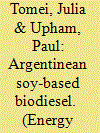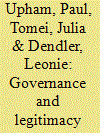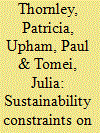|
|
|
Sort Order |
|
|
|
Items / Page
|
|
|
|
|
|
|
| Srl | Item |
| 1 |
ID:
091547


|
|
|
|
|
| Publication |
2009.
|
| Summary/Abstract |
This paper explores the economic, social and environmental context, drivers and impacts of increased demand for Argentine soy-based biodiesel. It is based on extensive stakeholder interviews in Argentina, including those in government, academia and the third sector; as well as participant observation with communities in soy cultivation areas; and review of relevant academic and grey literatures. Given Argentina's history of political instability and relatively weak levels of environmental protection, there is reason to be sceptical of the likely effectiveness of biofuel sustainability certification as applied to Argentine soy. Direct contracts between feedstock producers and biodiesel retailers may be a more reliable approach to minimise adverse environmental and social impacts than certification alone.
|
|
|
|
|
|
|
|
|
|
|
|
|
|
|
|
| 2 |
ID:
104939


|
|
|
|
|
| Publication |
2011.
|
| Summary/Abstract |
Biofuel policy has become highly contentious in Europe. In this paper we discuss the governance and legitimacy aspects of the carbon and sustainability system of the UK Renewable Transport Fuel Obligation (RTFO), both before and after implementation of the Renewable Energy Directive. RTFO certification is of a meta-type, being built upon existing certification and labelling schemes, each of which are more or less contested by NGOs. Despite the RTFO being based on these non-state initiatives, so far the concerns of environment and development NGOs and others have not been given serious expression in regulatory terms. Indeed, biofuel policy development in the UK has arguably been unduly non-responsive to critical opinion, given the limited scientific base on biofuel impacts and the reliance of RTFO sustainability certification on non-state actors and schemes. Drawing on documentary evidence, interviews and three sets of literatures - co-production of regulation; post-normal science; and legitimacy of non-state certification and labelling processes - we suggest that until concerned voices are given a stronger expression in UK and EC biofuel policy development, the policy cannot yet be said to have achieved a wide social mandate.
|
|
|
|
|
|
|
|
|
|
|
|
|
|
|
|
| 3 |
ID:
114326


|
|
|
|
|
| Publication |
2012.
|
| Summary/Abstract |
Bioenergy is an important renewable energy resource. However, assessments of the future of bioenergy are beset with uncertainty and contested values, suggesting that a precautionary approach to bioenergy resource development may be warranted.
This paper uses UK MARKAL to examine the implications of adopting a precautionary approach to bioenergy development in the UK. The paper reports a detailed review of UK bioenergy resources and sustainability constraints, and develops precautionary and optimistic resource scenarios. The paper then examines the implications of these scenarios using the energy systems model MARKAL, finding that a precautionary approach adds to the cost of decarbonisation, but does not significantly alter the optimal technology mix. In particular, biomass and co-firing CCS emerge as optimal technologies across scenarios.
The question of UK land availability for bioenergy production is highlighted within the paper. With less land available for bioenergy production, the costs of decarbonisation will rise; whereas if more land is available for bioenergy, then less land is available for either food production or ecosystem conservation. This paper quantifies one side of this trade-off, by estimating the additional costs incurred when UK land availability for bioenergy production is constrained.
|
|
|
|
|
|
|
|
|
|
|
|
|
|
|
|
| 4 |
ID:
092845


|
|
|
|
|
| Publication |
2009.
|
| Summary/Abstract |
Use of bioenergy as a renewable resource is increasing in many parts of the world and can generate significant environmental, economic and social benefits if managed with due regard to sustainability constraints. This work reviews the environmental, social and economic constraints on key feedstocks for UK heat, power and transport fuel. Key sustainability constraints include greenhouse gas savings achieved for different fuels, land availability, air quality impacts and facility siting. Applying those constraints, we estimate that existing technologies would facilitate a sustainability constrained level of medium-term bioenergy/biofuel supply to the UK of 4.9% of total energy demand, broken down into 4.3% of heat demands, 4.3% of electricity, and 5.8% of transport fuel. This suggests that attempts to increase the supply above these levels could have counterproductive sustainability impacts in the absence of compensating technology developments or identification of additional resources. The barriers that currently prevent this level of supply being achieved have been analysed and classified. This suggests that the biggest policy impacts would be in stimulating the market for heat demand in rural areas, supporting feedstock prices in a manner that incentivised efficient use/maximum
|
|
|
|
|
|
|
|
|
|
|
|
|
|
|
|
|
|
|
|
|